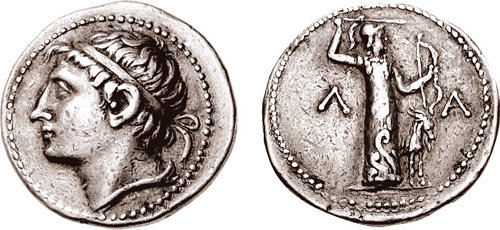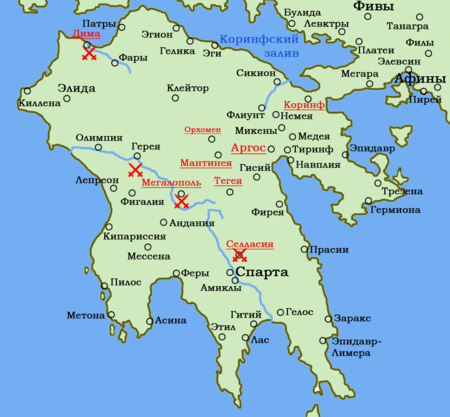Social Reforms in Hellenistic Greece
A major event in the social life of Sparta during this time was the reforms initiated by Agis and Cleomenes. These reforms were driven by the Spartan kings but also supported by popular demands. In the 3rd century BC, the writings of the philosopher Sphaerus, a disciple of Zeno, the founder of the Stoic school, were particularly influential among the Spartan elite. In line with the Stoic philosophy that was fashionable at the time, Sphaerus criticized contemporary society for its moral decline, luxury, wealth, and greed, while idealizing the ancient Spartan constitution and the system of Lycurgus, to which he dedicated a special treatise.
Agis IV (r. 245–241 BC), and later Cleomenes, were both followers and ardent admirers of Sphaerus. According to Plutarch, in his biography of Agis, "with his intellect and noble qualities" (Plutarch, Agis, IV), Agis surpassed not only his co-ruler King Leonidas but all kings since Agesilaus the Great. Upon becoming king, Agis aimed to revive ancient Sparta. Inspired by Sphaerus' teachings, he believed that the state should take control of land and redistribute it among the landless Spartans (Spartiates). He also advocated for the cancellation of debts. Agis began his campaign for these reforms among the ruling class and then extended it to broader circles of free citizens.
Agis' agitation was successful, attracting some members of the aristocracy who, driven either by ideological or self-serving reasons, joined the reformist party. Agis was supported by his uncle Agesilaus, his mother Agesistrata, Lysander (a descendant of the famous Lysander of the Peloponnesian War), and other wealthy and influential Spartans. Unfortunately, our knowledge of Agis is very incomplete and one-sided.
 Coin of Cleomenes III. The reverse depicts Artemis Ortius
Coin of Cleomenes III. The reverse depicts Artemis Ortius
Plutarch evaluates Agis primarily from a moral standpoint, attributing all the reforms to the moral motivations of the young, idealistically inclined ruler. However, the reality was likely different. Agis, like Cleomenes after him, sought to transform Sparta into a military-bureaucratic state of the Hellenistic type with centralized (royal) power and to establish Spartan hegemony in the Peloponnese. To achieve this, it was necessary to reform the Spartan state structure and increase the number of full-fledged and capable Spartiates by providing them with land.
Initially, Agis hoped to implement his reforms through the ephorate and in 243 BC succeeded in electing his supporter Lysander as ephor. As ephor, Lysander immediately introduced the bill to the Gerousia, Sparta's highest governing body. However, the Gerousia rejected Lysander's proposal, prompting him to bring it before the Apella (the assembly of citizens). Agis himself defended the bill in the Apella, even renouncing his extensive estates, worth 600 Attic talents, in favor of the state. Agis advocated for the restoration of the Lycurgian system. "I want," said Agis, "to expel greed and pride from Sparta. I fear that differences in lifestyle and moral corruption will bring division and decay to our state..."
In appearance and lifestyle, King Agis resembled an ordinary citizen. Following the philosophers of the Cynic school, he wore a short cloak, had long hair, led an austere life, and ate simple food. Agis' speeches turned the oligarchs against him, who accused the reforming king of being an egoist seeking to establish tyranny in Sparta. The following year, in 242 BC, the situation worsened; Lysander's term as ephor ended, and the new ephorate was composed entirely of oligarchs. This forced Agis to take more decisive actions: he dissolved the ephorate, opened debtors' prisons, and canceled debts. The debt certificates were gathered into a pile and burned in the square.
In an effort to strengthen the Spartan army, Agis proposed distributing land plots to 19,500 Spartiates and perioeci. He also suggested granting the perioeci civil rights. However, the land redistribution was never carried out because Agis had to leave urgently to fight the Aetolians, who had invaded the Peloponnese. During the king's absence, the opponents of the reforms swayed public opinion, repealed the reforms, and put the reformer himself on trial. Upon his return from the military campaign, Agis was accused of aspiring to tyranny and sentenced to death. Agis, along with his mother and grandmother, was strangled in prison.
However, Agis' death did not stop the movement he had started. A few years later, his cause was taken up by the new king, Cleomenes III (r. 235–221 BC), who was married to Agis' widow. Cleomenes learned much from Agis' experience, realizing that the reform could only be carried out forcibly through a military coup by eliminating the ephorate and the Gerousia, which had obstructed its implementation. The war with the Achaean League, which sought to establish its hegemony in all the cities of the Peloponnese, provided the young king with an opportunity to demonstrate his outstanding military abilities. After one of the victories over the Achaeans, Cleomenes, with a detachment of mercenaries, marched on Sparta and staged a coup. Cleomenes' soldiers burst into the syssitia, where the ephors were gathered, threw out their chairs, and killed them. Eighty of the most influential oligarchs who opposed the reforms were exiled, and the ephorate and the Gerousia were abolished.
"If the ephors," Cleomenes said at the people's assembly, "had not so abused their power, they could have been tolerated, but now they have exceeded all limits of endurance. They have completely destroyed royal authority while elevating their own; at their whim, they exile kings, put them on trial, and kill them. The ephors declare as enemies all who strive to restore the constitution of Lycurgus" (Plutarch, Cleomenes, 10). In conclusion, Cleomenes emphasized that if he could peacefully cure Sparta of all the "diseases brought from outside"—indolence, luxury, debts, and loans, and most importantly, the root of all vices, poverty, and wealth—he would consider himself the happiest of all kings in the world.
 Map of the Cleomenean War
Map of the Cleomenean War
The day after the coup, Cleomenes convened a people's assembly to explain the recent events and begin reorganizing the state on new principles, including the cancellation of debts and redistribution of property. This redistribution significantly increased the number of citizens and capable soldiers, and in addition, several thousand perioeci were added to the citizen lists, making the Spartan militia a formidable force. Cleomenes' economic measures were merely a prelude to his further political and social reforms. Cleomenes aimed to educate Spartan youth in the spirit of Stoic philosophy. He dreamed of transforming people, making them "good in every way." Therefore, as Plutarch reports, Cleomenes paid special attention to the education and training of the youth. Spartan youth spent their time in learning, gymnastics, and military exercises. The king himself supervised their education, serving as an example of simplicity, modesty, and moderation. The initial success of the reforms was complete.
Cleomenes' popularity in Sparta grew. "Cleomenes," writes Plutarch, "aroused great astonishment with his energy and intelligence. Those who had previously mocked him when he said that in proclaiming the cancellation of debts and redistribution of land he was following the examples of Solon and Lycurgus, now fully believed that the one responsible for all the changes among the Spartans was indeed him and no one else" (Plutarch, Cleomenes, 7, 8, 10, 23). Cleomenes' reform revitalized the Spartan community, raised the prestige of the royal authority, and made Sparta capable of new wars and victories. The results of these transformations soon became evident in the war with the Achaean League. In this war, Cleomenes, relying on his army, achieved successes. Cleomenes' troops were widely admired and respected. Cleomenes was seen as a deliverer from all troubles and a herald of a new life. The masses of poor people in the cities of the Peloponnese, through which the Spartans marched, sided with Cleomenes or expressed sympathy, ready at his first command to start a purge of their oligarchic rulers. Everywhere, people demanded the cancellation of debts and redistribution of land. Arcadia, Argos, Corinth, and part of Achaea supported Cleomenes.
At that point, the leader of the Achaean League and its de facto dictator, Aratus, fearing the outbreak of a democratic movement and seeing no other way out, entered into negotiations with the Macedonian king Antigonus Doson. Class interests prompted Aratus to abandon all the achievements made in the preceding years in the struggle against Macedonia. He himself was a wealthy man and defended the interests of the rich. The Macedonian king advanced to help Aratus with a 40,000-strong army. He inflicted several defeats on the Spartans, broke into the Peloponnese, and captured the cities of Orchomenos, Mantinea, and others, subjecting them to harsh treatment. Antigonus, however, did not stop there. His goal was the complete defeat of Sparta. The situation for Cleomenes became critical. Surrounded by enemies, he resorted to extreme measures: enlisting the helots into the army. According to one version, six thousand, and according to another, nine thousand helots were allowed to buy their freedom for five Attic minas, which was a very large sum. How many helots must have been in Sparta in the 3rd century if nine thousand of them had the means for such a ransom! But even this did not save the situation. At the approaches to Laconia, in the narrow passes of Sellasia, in 221 BC, Cleomenes suffered a complete defeat, losing the majority of his 20,000-strong army. The victory belonged to Macedonia. Cleomenes fled to Egypt to his ally Ptolemy Euergetes, where he died several years later.
Related topics
Literature
- Plutarch. Comparative biographies: Cleomenes
- Kleomenes, Spartan kings / / Encyclopedia of Brockhaus and Efron : in 86 vols. (82 vols. and 4 supplements). - St. Petersburg, 1890-1907.
- The History of Ancient Greece. Edited by V. I. Kuzishchin, ed. 3, transl. Moscow: Vysshaya Shkola Publ., 2001
- World History in 24 vols. Vol. 4. "Hellenistic period", Minsk, "Literature", 1996


